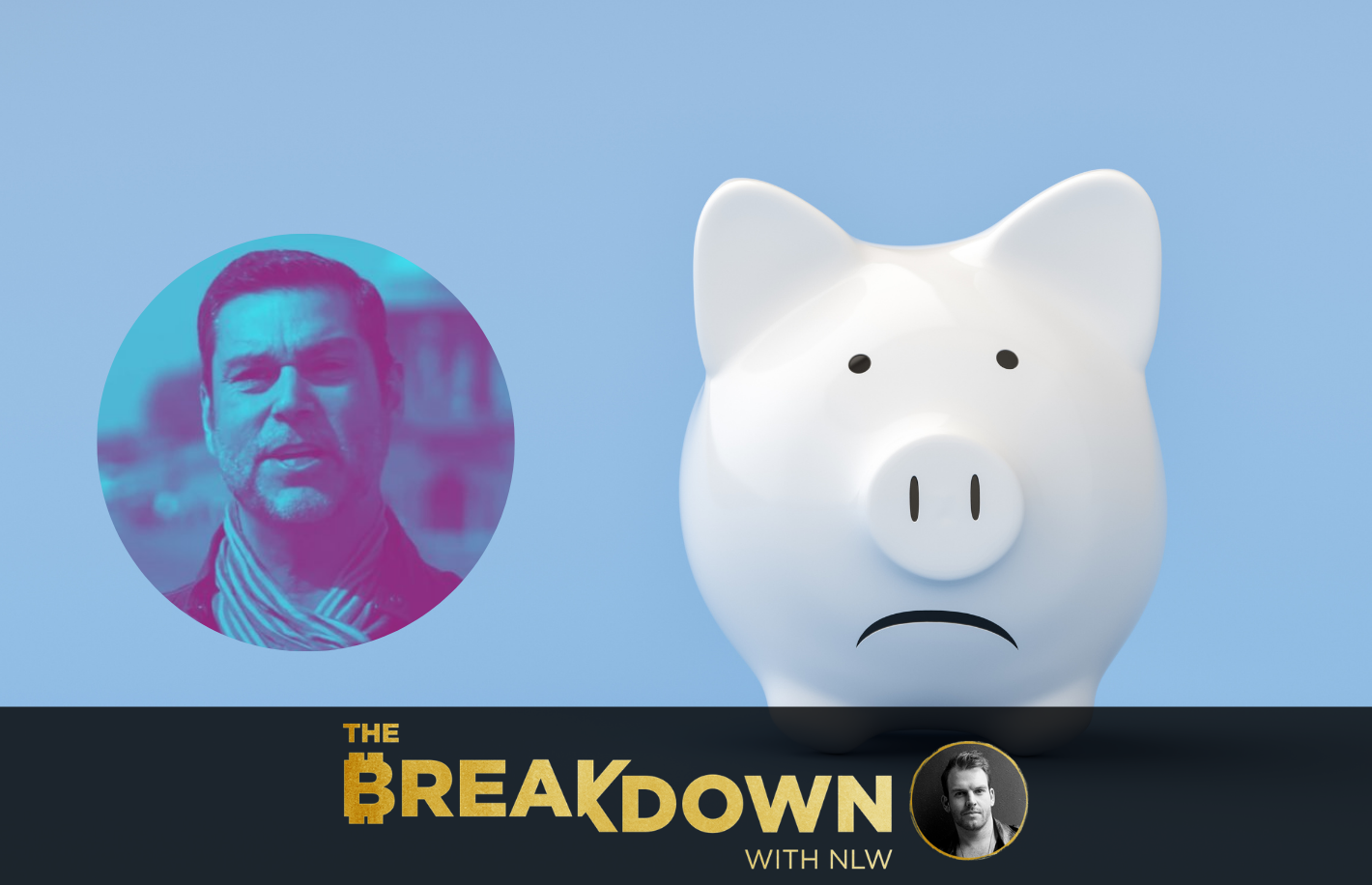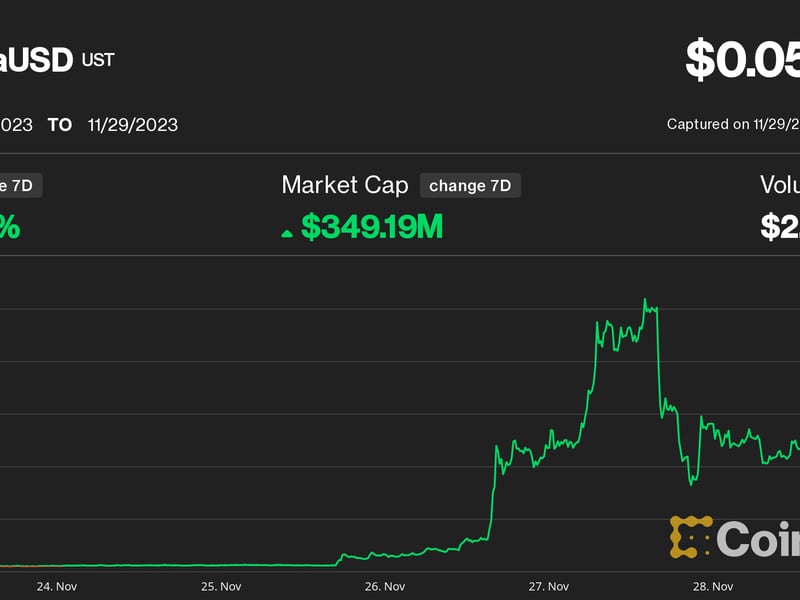The Protocol: Justin Sun, Bitcoin Mempool Sniping, XRP for Harris, Inspirational Women
Is Tron founder Justin Sun good or bad for wrapped bitcoin (WBTC), the Ethereum token backed by bitcoin held in custody? It was a one-sided argument before – mostly bad. Now, there’s a counterargument that’s not entirely crazy. Read down for our exclusive interview with Robert Liu, director at BiT Global, a new Hong Kong-based custodian advised by Sun that holds one of the project’s three keys.

02:02
Nigeria Frees Binance’s Gambaryan; Peter Todd Goes Into Hiding After HBO Doc Names Him Satoshi

13:23
Navigating the Crypto Waters With Nick van Eck

01:44
Bitcoin’s $4.2B October Options Expiry May Bring Short-Term Volatility

02:51
Stripe Bets Big on Stablecoins with Bridge Buy; Ripple’s Larsen Leads Harris Crypto Donations
-
City of Buenos Aires adopts blockchain ID service.
-
Is dark money manipulating Polymarket?
-
$10M in XRP tokens for Kamala Harris.
-
Nigeria withdraws charges against jailed Binance exec.
-
21-year-old’s crypto project raises $6.9M
-
Top picks from the past week’s
Protocol Village
column: Cosmology, Cubist, Fuel Labs, Walrus Protocol, pseudonymous developers (0xCygaar, 0xBeans and 0xMons).
-
$45M+ of blockchain project fundraisings.
-
SPECIAL: Inspirational women of Web3 and AI.
This article is featured in the latest issue of The Protocol, our weekly newsletter exploring the tech behind crypto, one block at a time. Sign up here to get it in your inbox every Wednesday.
Network News
:format(jpg)/cloudfront-us-east-1.images.arcpublishing.com/coindesk/ZF6YMZB6RRGLHOSB3KCJV6TPWI.png)
Schematic of QuarkID architecture, from the project documentation (QuarkID)
MUNICIPAL INTEGRATION: The city of Buenos Aires has launched a digital identity service designed to strengthen residents’ privacy using zero-knowledge proofs, a type of cryptography that long predates but often bolsters cryptocurrencies. The service, QuarkID, has been integrated into miBA, the city’s seven-year-old app for accessing municipal services and documents. The idea, in short, is to give 3.6 million porteños – residents of Buenos Aires – greater control over their personal information. The ZK proofs will let users show that a document has indeed been authenticated by the government without disclosing information that is irrelevant to the task at hand. The development has got some industry executives buzzing: “It sounds like if this goes well, other countries in the region, like Uruguay, could follow suit,” Harrison Seletsky, director of business development at digital identity platform SPACE ID, told CoinDesk in an emailed statement.
ELECTION PUSH. Is dark money is manipulating prediction markets? A mysterious high-stakes bettor, identified as “Fredi9999,” has spent $25 million solely betting on Trump across prediction markets, according to research done by Polymarket whale “Domer.” Fredi, according to on-chain detective work done by Domer, appears to operate under multiple accounts – Fredi9999, PrincessCaro, Michie and Theo – funded through sizable Kraken deposits (in precise amounts like $500,000 or $1 million). The matter has drawn mainstream media attention, from the likes of the Wall Street Journal and Reuters, while inspiring speculation over whether the trader was “spending heavily to ‘paint the tape’ and make a Trump victory appear more likely.”
DE-REBRANDING? The DeFi project formerly known as Maker, now known as Sky, could soon be formerly known as Sky, once again known as Maker. The reconsideration of its recent marketing and branding overhaul came in response to a lukewarm reception, and after a successful launch of the USDS stablecoin. “It is also now more clear than ever just how much the DeFi community loves and trusts the Maker brand,” Sky co-founder Rune Christensen wrote on its governance forum. “There was a lot of affinity for the brand and what it stands for: stability, security, and DeFi scale. And there is a lot of commitment to holding the MKR token versus upgrading to SKY.”
XRP FOR HARRIS! Ripple co-founder and Executive Chairman Chris Larsen said he’s pitching in with $10 million in XRP tokens to the political action committee Future Forward, in support of U.S. Vice President Kamala Harris’s run for president as the Democratic candidate. “It’s time for the Democrats to have a new approach to tech innovation, including crypto,” he wrote, adding that Harris “will ensure that American technology dominates the world.” Federal Election Commission records show Larsen had previously donated $1,750,000 to the PAC. He’s also given hundreds of thousands of dollars to Democratic congressional campaigns.
CHARGES WITHDRAWN. Nigeria’s government has withdrawn the money laundering charges against Binance executive Tigran Gambaryan days after a court denied him bail, local news outlet Punch reported first on Wednesday. “People are on the way to give the order” to the Kuje prison and then he should be released “immediately,” Gambaryan’s lawyer Mark Mordi told CoinDesk on the phone. He did not share any other details about when Gambaryan is expected to leave the country.
:format(jpg)/cloudfront-us-east-1.images.arcpublishing.com/coindesk/HHDPFKPS3JFX5ECFIN6AP6747A.jpg)
Satflow takes aim at the practice known as ‘mempool sniping’ in new decentralized exchange for trading Ordinals and Runes tokens (A.B. Frost/Wikipedia, modified by CoinDesk using PhotoMosh)
Satflow, a Bitcoin infrastructure firm focused on the Ordinals and Runes ecosystems, has introduced a decentralized exchange (DEX) for professional traders – positioned as a less-expensive alternative to the popular NFT marketplace Magic Eden. In a press release shared with CoinDesk, Satflow said that its fees initially will be 0%, claiming they would be a couple percentage points lower than Magic Eden’s. The new DEX’s aim is to eliminate the practice of mempool sniping, which is when users exploit the time lag in which a transaction is waiting to be added to a Bitcoin block.
Coinbase Institutional Research wrote in a weekly report, referring to Ethereum co-founder Vitalik Buterin’s recent blog posts on the blockchain’s project roadmap, that “the majority of the content remains largely academic and unlikely to be a near-term market driver.”
World Liberty Financial, the startup DeFi project touted by Republican U.S. presidential candidate Donald Trump, “is a more of an idea than a protocol,” Galaxy Research’s Thad Pinakiewicz wrote in a newsletter. “It’s a governance token that has no value accrual for a project that doesn’t yet exist. Details were scant leading up to the protocol launch and they remain so now. There has been no code released, no detailed project plan, just broad strokes of what the team plans to do with the project.” He added: “The market is clearly not convinced of the protocol’s future even with crypto’s tendency to lean more Republican.”
Justin Sun Might Be Good for Wrapped Bitcoin, Says New Custodian’s Director
:format(jpg)/cloudfront-us-east-1.images.arcpublishing.com/coindesk/TZMNZMVOWRDWTJX5LR6JACD37Q.jpg)
Sign with Justin Sun’s image in foreground of Tron party at Bitcoin Nasvhille in July (Bradley Keoun)
In August, the mere disclosure that Tron founder Justin Sun was involved in the custody operations related to wrapped bitcoin (WBTC) – a popular token in decentralized finance – was enough to rattle the crypto industry.
At least one major decentralized finance (DeFi) project considered eliminating WBTC completely as a collateral option, and several major crypto players, including the exchange Coinbase, rushed out competing products.
Sun is seen as controversial by some crypto industry analysts, owing to his involvement in various stablecoin projects that turned turbulent, and in other instances where a lack of transparency was cited.
BitGo, the original and longtime custodian of the bitcoin backing WBTC, announced on Aug. 9 that it would distribute control over the project’s custody to three entities globally instead of just one – as a way of helping to decentralize the operation. According to the release, BiT Global is a global custody platform with regulated operations based in Hong Kong, registered as a Trust and Company Service Provider (TCSP), and is a “a strategic partnership between BitGo, Justin Sun and the Tron ecosystem.”
WBTC is a token that allows investors to use bitcoin (BTC) on other blockchains, and plays a key role in lending DeFi as collateral, with a $9 billion market capitalization.
BiTGlobal is now one of three holders of the keys overseeing the bitcoin in custody, project officials have confirmed.
But what if Sun’s involvement is a strength rather than a liability?
This argument was made to CoinDesk this week by BitGlobal director Robert Liu, in an exclusive interview.
What exactly is Sun’s role with the project? And who owns it? We got some clarity, but not total clarity.
Money Center
:format(jpg)/cloudfront-us-east-1.images.arcpublishing.com/coindesk/MYETXOKWARFMHJVTZPS5S3GZ2A.jpeg)
Jackson Denka, the 21-year-old founder of Azura (Azura)
-
Azura, a new DeFi platform, has emerged from stealth with $6.9 million in funding led by Initialized Capital, backed by Winklevoss Capital and Solana’s Raj Gokal, according to the team: “Azura aims to unify DeFi with an omnichain platform that aggregates liquidity across multiple blockchains and protocols, simplifying trading and yield farming. Its intent-based order routing tackles the fragmentation of onchain assets, enhancing the DeFi user experience while preserving decentralization. Built by top engineers, Azura seeks to drive broader adoption.”
-
Others (Details in
Protocol Village column
): zkPass ($12.5M), Opacity ($12M), Karpatkey ($7M), Drop ($4M), Hyve ($1.85M), Hermetica ($1.7M).
THE PROTOCOL SPECIAL: ‘Most Inspirational’ Women of Web3 and AI
Unstoppable Women of Web3 and AI, an organization founded in 2022 by Unstoppable Domains COO Sandy Carter and committed to fostering diverse talent in the industry, released its “Most Inspirational Women in Web3 and AI” list for 2024. Some 135 women were named, according to a post on X, announced on stage at Singularity South Africa, according to a message from the team. Winners included:
-
Fei Fei Li, the Godmother of AI
-
Melanie Perkins, CEO of Canva
-
Mellun Yen, VC and founder of Collective Operative
-
Sasha Luccioni, AI researcher at Hugging Face
-
Lisa Loud, CEO of Secret Network
-
Kathleen Breitman, CEO of Tezos
-
Natalia Karayaneva – CEO of Propy Inc.
Just-Released Crypto Book Highlights “Lessons Learned”
:format(jpg)/cloudfront-us-east-1.images.arcpublishing.com/coindesk/2LOZEVN6MNEKTMLDHSWVXPEWSI.png)
Screengrab from cover illustration from electronic copy of the new book (Qian, Alizadehfard Piech)
Three crypto-industry vets based in UAE have written a book, “Lessons Learned (The Story of Crypto Winners and Losers),” to share their experiences. A PR firm was kind enough to share a preview copy with us. The authors are Bill Qian, Seyed Mohammad Alizadehfard (Bijan) and Stefan Piech. The following is an excerpt:
The slow decline of Litecoin offers valuable lessons for the cryptocurrency community and future projects:
-
Continuous Innovation: Projects must continuously innovate to stay relevant in the fast-paced cryptocurrency landscape. Stagnation can lead to obsolescence as newer and more advanced technologies emerge.
-
Clear Use Case: Maintaining a clear and compelling use case is essential for long-term success. Projects that fail to adapt to changing market demands and technological advancements risk losing their relevance.
-
Community Engagement: A strong and engaged community is vital for a project’s sustainability. Active development, transparent communication, and community involvement can foster loyalty and support.
-
Strategic Leadership: Leadership decisions can significantly impact a project’s trajectory. Transparent and committed leadership is crucial for maintaining trust and confidence within the community.
Litecoin’s story highlights the complexities of sustaining relevance and adoption in the rapidly evolving cryptocurrency landscape. Despite its initial success and substantial market valuation, Litecoin has struggled to keep pace with technological advancements and changing market dynamics. The lessons learned from its decline underscore the importance of continuous innovation, clear use cases, community engagement, and strategic leadership in building and sustaining successful cryptocurrency projects. As the cryptocurrency market continues to evolve, these insights can guide new and existing projects toward long-term success and relevance.
Protocol Village
Top picks of the past week from our Protocol Village column, highlighting key blockchain tech upgrades and news.
:format(jpg)/cloudfront-us-east-1.images.arcpublishing.com/coindesk/4LGXJ5HOM5CRHN2SSMS6ZSPBB4.jpg)
Dan Lynch introduces Hyperweb onstage at Cosmoverse on Wednesday. (Comsology)
-
Cosmology, a developer of tools for the Cosmos-based IBC ecosystem, announced the launch of Hyperweb, “an end-to-end TypeScript blockchain ecosystem bringing JavaScript developers on-chain.” According to the team: “With best-in-class UI and client-side tooling along with a TypeScript smart contract development environment, Hyperweb is the culmination of Cosmology’s success creating Web3 dev tooling used by hundreds of blockchains, including dYdX, Celestia and Osmosis. Building on Founder Dan Lynch’s decades of building enterprise no-code solutions for Fortune 100 enterprises like GE and Visa, Hyperweb realizes the vision of a “no-chain” platform for Web3 dApp development.” The announcement was due to be made at Cosmoverse in Dubai on Wednesday.
-
PROTOCOL VILLAGE EXCLUSIVE: Cubist, a blockchain startup focused on key management led by applied-cryptography expert and Carnegie Mellon computer-engineering professor Riad Wahby, announced the launch of a new bridge security system, Bascule. According to the team: “Bascule will effectively prevent staking hacks in real-time and eliminate custodial risk in staking projects. Bascule reports all user deposits made on a given chain to a smart contract on a second chain, providing a cross-check that solves the fundamental lack of reconciliation between deposits and withdrawals that leads to almost all serious bridge hacks.
-
Fuel Labs, developer of an operating system purpose-built for Ethereum rollups, announced the mainnet launch of Fuel Ignition, its flagship Ethereum layer 2. According to the team: “Ignition is designed to address a creeping centralization infecting blockchain ecosystems by delivering a new high performance architecture to Ethereum that runs on affordable consumer hardware. The Fuel architecture features parallel transaction capabilities that deliver 21,000+ Transactions Per Second (TPS) per core stemming from its novel virtual machine architecture, the FuelVM and an Unspent Transaction Output (UTXO) based asset-centric transaction model.” According to the project documentation: “We embrace the UTXO model while supporting full Turing-complete smart contracts with persistent storage.
-
Walrus Protocol, a decentralized data storage network whose original contributor is Sui developer Mysten Labs, has launched its public testnet on Sui, “providing a management architecture for Walrus to store its global state and metadata that offers speedy consensus, composability and the opportunity to integrate storage into smart contracts,” according to the team. Also, “Akord, a secure storage and collaboration platform that provides user-friendly, cost-effective, and decentralized storage solutions, will be migrating from Arweave to Walrus within the next week.”
-
A trio of pseudonymous crypto developers proposed a new mechanism called “Panoramic Governance” to incentivize governance participation and protocol growth within layer-2 blockchains. According to the whitepaper, written by 0xCygaar, 0xBeans and 0xMons: “Panoramic Governance can be implemented on any layer-2 blockchain with a native governance token and a sequencing system where users pay gas fees for faster transaction ordering and trusted pre-confirmations.
Calendar
-
Nov. 10:
OP_NEXT
Bitcoin scaling conference, Boston.
-
Jan. 21-25:
WAGMI
conference, Miami.









